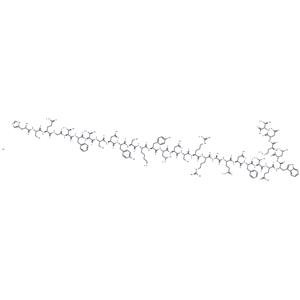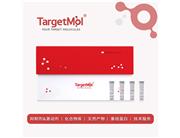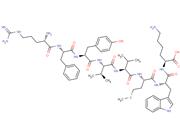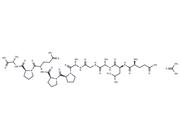| Name | Glucagon (1-29), bovine, human, porcine hydrochloride |
| Description | Glucagon (1-29), bovine, human, porcine hydrochloride (Porcine glucagon hydrochloride) is a peptide hormone produced by pancreatic α-cells that activates HNF4α, increases HNF4α phosphorylation, and stimulates gluconeogenesis. |
| In vitro | Glucagon stimulates both hepatic kisspeptin1 production and gluconeogenesis. Upon binding to its receptor Gcgr, Glucagon activates cAMP-PKA signaling to stimulate hepatic glucose production (HGP) and cause hyperglycemia. Glucagon (100 nM) increases the phosphorylation of HNF4α. Glucagon (100 nM) represses CYP7A1 mRNA expression in human primary hepatocytes [3]. |
| In vivo | Glucagon (20 μg/kg) increases glycemia and does not stimulate insulin secretion in ambient-fed mice. High-dose (1 mg/kg) Glucagon lowers glycemia compared with PBS control and stimulates insulin secretion in ambient-fed mice [4]. |
| Storage | store at low temperature,keep away from moisture | Powder: -20°C for 3 years | In solvent: -80°C for 1 year | Shipping with blue ice. |
| Solubility Information | DMSO : 10 mM
H2O : 40 mg/mL (11.37 mM), Sonication is recommended.
|
| Keywords | Porcine glucagon | peptide | hormone | gluconeogenesis | Inhibitor | pancreatic α | Glucagon (129), bovine, human, porcine hydrochloride | GCGR | inhibit | Glucagon Receptor | Glucagon Hydrochloride | HNF4α | HNF-4 | Glucagon (1-29), bovine, human, porcine | Porcine glucagon Hydrochloride | Glucagon , bovine, human, porcine Hydrochloride | Glucagon (1 29), bovine, human, porcine hydrochloride |
| Inhibitors Related | Hydrocortisone | Mifepristone | Corticosterone |
| Related Compound Libraries | Anti-Diabetic Compound Library | Peptide Compound Library | Endocrinology-Hormone Compound Library | NO PAINS Compound Library | Anti-Cancer Compound Library | Anti-Metabolism Disease Compound Library |

 United States
United States



